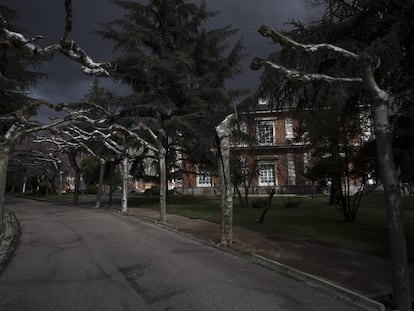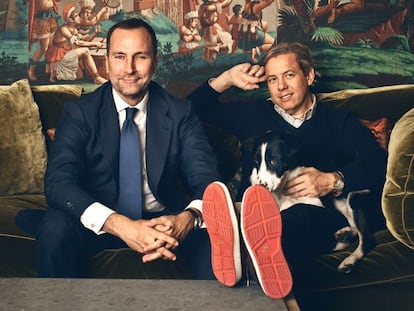Memoirs of an ambassador
In these extracts from his new book, former US ambassador to Spain James Costos talks about throwing parties for Michelle Obama, seeing history made from his living room and negotiating uncomfortable political situations
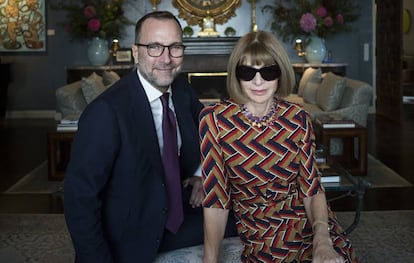
James Costos was the US ambassador to Spain during the administration of President Barack Obama. With the help of his husband Michael, he forged bonds with some of the highest-profile figures in public life, from the Spanish royal family to the occupants of Spain��s seat of government, La Moncloa. He talks about those years in these extracts from his new book, El Amigo Americano (The American Friend), which he penned alongside writer Santiago Roncagliolo, and is out in Spanish this month.
Barack Obama��s 24 hours in Spain
The president��s team selected guests from a number of investors, according to their level of interests in the US and according to their sector �C Ana Bot��n from the Santander Group, Jos�� Mar��a ?lvarez-Pallete from Telef��nica, financier ?scar Fanjul, the founder of the Vips group, Pl��cido Arango and his partner, the sculptor Cristina Iglesias, as a representative for the arts, Spanish architect Alberto Campo, because in his youth Obama had wanted to become an architect (though fortunately he ditched that idea) and, finally, Doctor Jos�� Baselga, representing the medical sector. All of them received a call that same Saturday morning: ��If you��re in Madrid, we are inviting you to lunch at the embassy.�� [...]
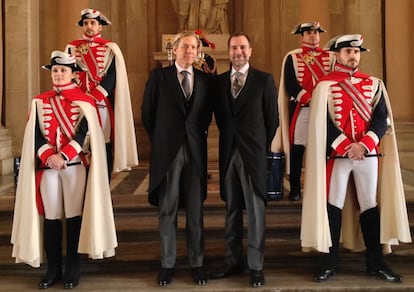
Later, [then-Prime Minister] Mariano Rajoy held an official meeting with his counterpart in La Moncloa. It was a very strange encounter because there was no government as such. Rajoy was ��acting prime minister.�� Spain had had two elections without being able to form a government and, although Rajoy was in the palace, he could not pass any laws through parliament, name new ministers or embark on important reforms. Rajoy gave Obama a jam��n as a gift, but he could not do much else. In his public statements, he seemed embarrassed by the situation.
As there was no elected government, the visit could not just focus on the Spanish prime minister. Obama had to make a gesture of goodwill toward all the possible heads of government. Our embassy had planned meetings with the leaders of the three main Spanish political parties besides the Popular Party (PP): the Socialist Party (PSOE), Ciudadanos and Podemos. I knew them all personally. I had met them all at the embassy individually to establish their position on relations between Spain and the United States and had formed an idea about all of them: Rivera seemed honest and committed to his ideas; Pedro S��nchez was polite and professional; and in the case of Pablo Iglesias, his capacity for seduction set all my alarm bells ringing.
It was a pivotal point in Spanish, and therefore Western, history and we were part of it
During my prior interview with Iglesias, he struck me as charming. His English was perfect. His delivery was smooth and his manner friendly. He was well versed in a variety of topics, including politics, entertainment, Hollywood and sport. And, of course, he knew about Obama. He told me that Podemos had studied our president��s campaign and had used it as a point of reference for its own. In short, he told you exactly what you wanted to hear... And then later he would capitalize on it to get the better of you.
With these types of meetings, the details are all arranged beforehand in order to avoid unpleasant surprises. One of the details Podemos and the embassy agreed upon was that there wouldn��t be any photos. This was to avoid there being an image of me with the leader of the far left, and to show the United States to be more aligned with S��nchez and Rivera, with whom there were photo sessions. Obviously diplomats are not authorized to ask for votes for any candidate, but we can have an opinion and express it through subtle gestures such as these.
These were subtleties that Iglesias didn��t care about, of course. When we said goodbye, there were no journalists but Podemos had brought along its own photographer. Iglesias asked for a picture and I thought, ��Okay, let��s see what happens if we do.�� The next day, the one photo that the embassy didn��t want was all over the media with headlines controlled by Podemos. And I was again criticized on social media with remarks such as, ��How is this possible?�� and ��Don��t meet with communists!��
Despite everything, the encounter served as a warning for what could happen with regard to Obama��s visit. As the trip was cut short due to protests in Texas, there was only one venue for the meeting between the president and the opposition leaders �C the air base in Torrej��n de Ardoz. They would be able to meet for a total of 15 minutes before the presidential plane prepared to fly to Rota. So Pedro S��nchez, Albert Rivera and Pablo Iglesias turned up there.
The base was not prepared for such an occasion. We had to put S��nchez, Rivera and Iglesias together in one room while Obama waited in the room next door and I came and went, accompanying each politician in turn. There was scarcely enough time for them to exchange a couple of words and take the photo between the flags as protocol dictates �C a curtain was used as a backdrop to hide the bare wall. The last in line was Pablo Iglesias, who had come without a jacket or tie. He was in jeans and wore his sleeves rolled up and he had brought a book for the president called The Lincoln Brigade about the US volunteers who fought for the Republic during the Spanish Civil War.
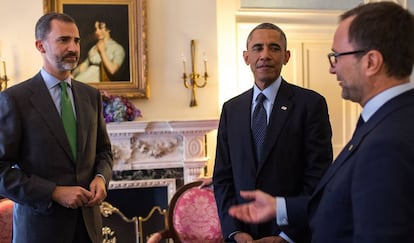
Protocol absolutely rules out giving heads of state gifts during these kinds of meetings. But I was already familiar with Iglesias [and his modus operandi]. And I wasn��t the only one. About a year earlier in Brussels, Iglesias had jumped the line to give King Felipe a DVD of Game of Thrones, which reflected badly on whoever was in charge. This time I was in charge.
��Please, not the book,�� I said, stopping him before he went in.
��Why not?�� he said. ��It��s just a book. Can��t I give a book to the president?��
There he was again. A real charmer. He made you want to say yes to everything. But I said no.
I got someone to take the book from him and deliver it to the president��s team. Obama never saw it, unless he looked for it in the gift section of the presidential archive in Washington. Anyway, when Iglesias emerged, he told the press that he had given the president the book. Like I said, he always knew exactly what everyone wanted to hear. (Comparing Rajoy and Iglesias��s gifts �C the ham and the book �C is a great way to understand the difference between them.)
The grand party
Halfway through 2011, in the run-up to Obama��s reelection campaign, Michelle Obama came to California to give a few speeches and raise funds. As we had a close relationship with her, the campaign team asked Michael and I to host a campaign event for Michelle in our house. ��It would mean a lot to us,�� they said. [...]
The house was looking great. Michael had filled it with flowers and delicious food. I wanted to give it a bright festive twist on the night so I added balloons. Enormous balloons in red, white and blue. It was the only American touch that night and it was fun. Michelle delivered a great speech that was both powerful and rousing. Later, my friend Virginia, a singer who worked with me at HBO, dedicated a song to her. It was perfect.
Rajoy gave Obama a ��jam��n,�� but he was incapable of much else
There were 380 guests, including Steven Spielberg, Jeffrey Katzenberg, Drew Barrymore, Ellen DeGeneres and producers from the big Hollywood studios. The tickets cost $35,000 [�30,540] but there were also some for $10,000 [�8,725] and even $500 [�436] because we wanted to invite and excite young people, particularly artists. After the song, the guests split into different rooms according to their tickets. Those with the most expensive tickets had a bit more time to talk and take photos with the guest of honor, but everyone was able to spend some time with her. [...]
The tired King
��You know Juan Carlos. We should talk to him,�� I advised Obama.
In fact, Juan Carlos had met all the US presidents since Kennedy, making him a very important figure in bilateral relations. In February 2010, during [former PSOE Prime Minister] Jos�� Luis Rodr��guez Zapatero��s term in office, King Juan Carlos had eaten with Obama in the White House. On that occasion, they had spoken at length about Latin America and Juan Carlos had been a decisive factor in Obama��s plans to thaw relations with Cuba. [...]
The presidential paraphernalia always includes a communications team because all the president��s conversations need to be both protected and monitored. That weekend, the Obama team set up camp in our living room and right there, still wearing his golf shorts, the president spoke to the king.
��Your Majesty,�� he said. ��I am with James Costos, our ambassador in your country. And we want to greet you in this moment of change for your historic reign [i.e. his abdication]. I would like to thank you for steadily promoting democracy in Spain and for your commitment to transatlantic relations. The friendship between our countries is very close and it will become even closer during your son Felipe��s reign.��
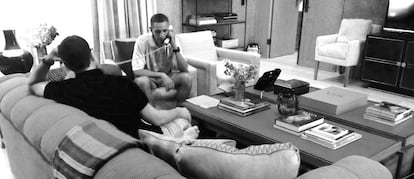
It was a pivotal point in Spanish, and therefore Western, history and we were part of it. This was one of the most fascinating aspects of my time as ambassador �C to be at home relaxing with my dogs and have global change take place in my living room. I still have a photo of that moment: it��s in black and white, which underscores the seriousness of it, although we look quite informal. I have bare feet and am lounging on the sofa. In front of me, President Obama is talking to Juan Carlos on the phone in his shorts.
Later, I asked the president to sign the photo. He wrote: ��Dear James, I love making history from Palm Springs.�� I still have the photo on my desk. It��s one of my favorites. [...]
Rainbow day
On July 2, the Madrid embassy threw a massive party for gay pride. This time, the invitation list was carefully scrutinized. I wanted important members of the collective from sectors across the board. I didn��t just want activists; I wanted businessmen, artists and workers. So we invited the first gay couple to be married [in Spain], Manuel R��denas and Javier G��mez, Judge Fernando Grande-Marlaska (now interior minister), designer Juanjo Oliva and the politician Javier Maroto...
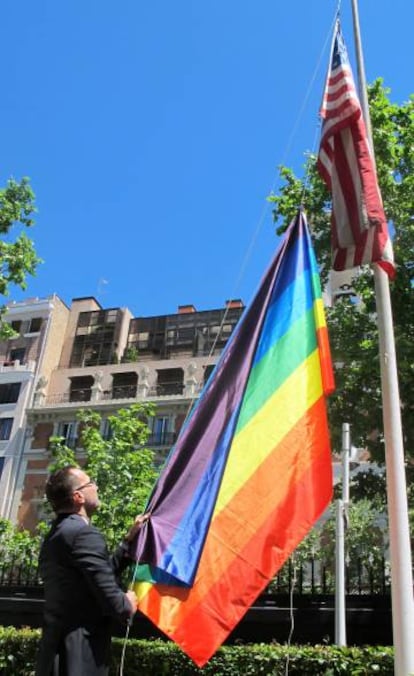
Naturally, I wanted to invite the man who had spearheaded the legalization of gay marriage in Spain, which had just had its 10th anniversary. And that was Jos�� Luis Rodr��guez Zapatero. But there were more than a few raised eyebrows when I mentioned his name at the embassy.
Zapatero was not welcome on US territory. He had become prime minister due to the general opposition to the Iraq War, which [former PP prime minister] Jos�� Mar��a Aznar had involved Spain in along with George W. Bush. During his electoral campaign, Zapatero had refused to stand in front of the US flag during a military parade on October 12. The photo of him sitting there while other members of the conservative government stood up was published on a slew of front pages and would come to symbolize his stance. When he came to power, he effectively withdrew Spain��s troops, which infuriated the Bush administration. Then, as several diplomats might recall, his first international visit was from [former Venezuelan president] Hugo Ch��vez who saluted his government in ��a revolutionary and anti-imperialist�� manner as soon as he got off the plane. Even today, Zapatero is friendlier with the dreadful regime of [Venezuelan President Nicol��s] Maduro than I would like.
But on the issue of civil rights, he had blazed the trail. And as far as President Obama was concerned, civil rights took precedence over wars on the global agenda. People don��t always strike us as perfect in every way. We often agree with them in some ways but not in others. But Obama��s policy, as was clear from his overtures of peace toward Cuba and Iran, focused on highlighting what brings us together to talk be able to talk about what divides us. So, despite warnings from my team, I assumed the responsibility of inviting Zapatero.
This is a celebration of love. And love always wins
And the day of the party, under the rainbow flag and the US flag and a bright Madrid sun, I welcomed 348 guests with the words: ��It��s a pleasure to welcome you into my home to celebrate the values of diversity and tolerance, values that enrich our societies... Today we are celebrating the fact that our Supreme Court has consecrated the right of our citizens to marry�� and we give thanks for this achievement to the thousands of individuals �C LGBTQ and their supporters �C who have spent decades breaking down the barriers of fear among their work colleagues, friends, relatives and society as a whole. It is an honor to celebrate together with those who were on the front line when Spain was able to extend these rights to its population and to celebrate the 10th anniversary of your gay marriage law with you. This is a celebration of love. And love always wins.��
The former prime minister then took the floor and moved everyone present, both Americans and Spanish, homosexuals and heterosexuals, diplomats and designers, with the following words: ��I have great admiration for President Obama. I have never felt at home in an embassy before, but that is how I feel today. I will rise from my seat happily �C 20 times if necessary �C as the new US flag passes before me. Mr Ambassador, your country and mine are more united than ever under this flag of dignity and equality.��
After the speeches, I kissed Michael on the lips and the party started.
English version by Heather Galloway.
